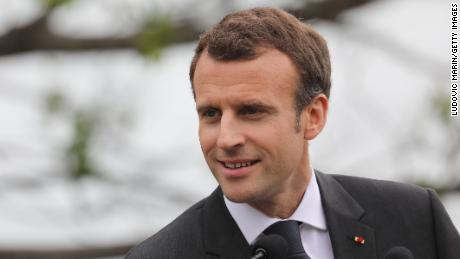Story highlights
- Just 25.8% percent of French members of Parliament are are women
- 19,000 people applied to be a candidate for Macron's La Republique En Marche! party
Paris (CNN)The party of French President-elect Emmanuel Macron has unveiled the names of more than 400 candidates for the June legislative elections -- and half of them are women.
At 39, Macron will be sworn in on Sunday as the youngest president in France's history, and he has promised to breathe new life into French politics and the country's sluggish economy.
Macron's is now looking to get his fledgling La Republique En Marche! party a strong presence in Parliament to push through his legislative agenda.
On Thursday, En Marche! secretary general Richard Ferrand announced that 214 men and 214 women had been selected to run for the party -- and added that 52% of the candidates had never held electoral office.
The announcement appears to fulfill the party's pledge in January that at least half its candidates would come from outside the political establishment and that half would be women.
En Marche! has said it will field a candidate in all 577 seats, so more are expected to be announced in coming weeks.
Ferrand said the party had 19,000 applicants, 71% of whom were men and 29% were women.
France ranks first in the world, along with Bulgaria and Nicaragua, for the highest proportion of women in ministerial positions, at more than 52%, UN Women data shows. But its female representation in Parliament is dramatically lower, at just 25.8%, ranking 63rd in the world.
Winning the most seats in Parliament will be no mean feat for En Marche!, which is less than a year old and is scrambling to finalize its list of candidates to contest all 577 seats.
Macron's party appears to be plucking candidates from traditional parties on both the left and right, causing panic among senior members of the establishment afraid of defections to the start-up outfit.
He said the candidates were from the whole political spectrum, with the exception of Le Pen's National Front.
"This pluralism is the expression of the President-elect's wish for a recomposition of the political landscape," Ferrand said at a press conference in Paris.
En Marche! has already rejected former Prime Minister Manuel Valls, saying that he did not fit the party's criteria. Valls has declared his own ruling Socialist Party dead after its crushing defeat in the presidential vote.
The votes will take place in two rounds on June 8 and 11 to elect members to the National Assembly, Parliament's lower house.
The party appeared somewhat shocked by its own success, and following Macron's meteoric win, En Marche! decided to rebrand itself, changing its name to La Republique En Marche! (The Republic on the Move) ahead of the legislative vote.
A female prime minister?
Macron is also expected to announce his pick for prime minister on Monday. He has given no clues as to who that will be, but has said that he is looking at one male and one female candidate.
France has only ever had one female prime minister, Edith Cresson, who served for less than a year between 1991 and 1992.
Macron has said that the prime minister's post may be temporary. If his party does not gain enough seats in the legislative elections, he may need to later offer the prime minister's post to a politician from an allied party.
Macron won a landslide victory last Sunday against his far-right rival Marine Le Pen, with more than 66% of the vote. Although he had the backing of his party, he ran as an independent.
Traditionally, the party of a new president wins the largest share of seats in Parliament, but En Marche! is still something of an unknown quantity to many, and it is not clear if loyal voters of the left or right will abandon their local representatives.
But an Elabe poll for CNN affiliate BFM found that 52% of people want Macron to have a majority of MPs behind him in Parliament, whether or not they are from En Marche! or allied parties.





















